Turkey laments exclusion from US training on F-35 jets
Ankara says US reaction to arrival of Russian S-400 missile system in Turkey is unjustified.

Ankara, Turkey – Turkey has hit back at its exclusion from the US F-35 stealth fighter programme, saying it had been kicked out without justification.
Turkish Air Force personnel, who had been training on the next-generation jet, were required to have left the United States earlier this week following the arrival of the Russian-made S-400 missile system in Turkey last month.
Keep reading
list of 4 itemsRussia-Ukraine war: List of key events, day 791
Biden signs law securing billions in US aid for Ukraine, Israel
Russia arrests deputy defence minister suspected of taking bribes
Turkish companies have been closely involved in the programme since its inception in 2001 and the country has invested $1.4bn into the development of the fighter with NATO allies.
“From the beginning, when we entered this programme, we have fulfilled our commitments,” Hami Aksoy, Foreign Ministry spokesperson, said at a televised news conference in Ankara.
“We are not a customer of the F-35 programme, we are its owners. While there’s no apparent justified reason or legal grounds, we are trying to be pushed out. This is not an acceptable situation. If we are pushed out of this process, we will have to try other ways.”
Washington has objected to Turkey buying the S-400 system, saying that operating it alongside the F-35 would compromise the fighter’s hi-tech secrets. It said it will not allow F-35s to operate in airspace where the Russian system is active.
In turn, Moscow has offered to sell Turkey its most advanced fighter, the Su-35.
Although about 40 Turkish air and ground crew are no longer involved in F-35 training – and another 20 Turkish staff have been cut from a joint office in Washington, DC – Turkish companies continue to be involved in providing more than 950 F-35 parts.
This has led to many observers seeing a sliver of a chance that Turkey could rejoin the programme.
Last week, Lockheed-Martin, the US company overseeing F-35 production, said the involvement of Turkish companies would end completely by March 2020.
The S-400 system, according to Turkey’s President Recep Tayyip Erdogan, would be operational the following month.
“For the US, the process of kicking Turkey completely out will extend to March 2020, which is one month before the deployment of the S-400, according to President Erdogan,” said Ali Bakeer, an Ankara-based political analyst and consultant.
“Theoretically, there’s still time to save this issue. Diplomatic doors haven’t closed.”
‘Good news for Turkey’
However, Turkey has been buoyed by US President Donald Trump‘s sympathetic stance towards the S-400 purchase. He has blamed the Barack Obama administration’s refusal to offer sufficient incentives to buy the US Patriot air defence system as the reason for Ankara seeking an alternative.
Trump also appears to be resisting pressure from the US Congress to impose economic sanctions on Turkey under the Countering America’s Adversaries Through Sanctions Act.
Nihat Ali Ozcan, a security policy analyst at the Economic Policy Research Foundation of Turkey, said Trump’s involvement was “good news for Turkey” while pointing out that Congress, as well as the Pentagon and US State Department, seemed more hawkish over punishing Turkey for the S-400 deal.
“I’m not sure Turkey can stay in the F-35 programme,” said Ozcan. “However, if Turkey does not activate the S-400 this can create a new platform for discussion.”
Hans Binnendijk, a fellow at the Atlantic Council and a former senior director for defence policy and arms control on the US National Security Council, said: “I think there is still time for a resolution but President Trump has only limited room for manoeuvre given congressional legislation.
Other than Aksoy’s comments, Turkish officials have been relatively quiet about the apparent end to the country’s role in the F-35 programme.
‘Trying to find a solution’
A statement issued following a six-hour meeting of the country’s National Security Council on Tuesday evening made only a passing mention of the issue.
Meanwhile, in an account of a Monday telephone call between Turkish Defence Minister Hulusi Akar and US Defence Secretary Mark Esper, the Turkish Ministry of Defence said Akar had stressed Turkey’s role as an F-35 investment and production partner.
“At this stage, there’s still a chance [for resuming Turkey’s role in the F-35] although it’s very slim,” Ankara-based analyst Bakeer said.
“Turkey and Erdogan haven’t closed the door on further bargaining and there’s a chance as long as Turkey doesn’t activate the missile system and the US doesn’t impose sanctions.”
The F-35 project is worth about $12bn to Turkish companies such as Roketsan, Turkish Aerospace Industries and Tusas Engine Industries. Removing these firms from the programme would incur extra costs and, according to former US Defence Secretary James Mattis, could delay delivery to other countries by up to two years.
With the suspension of delivery of the first of 116 F-35s to Turkey, which was due to start later this year, Lockheed-Martin has lost its fourth-largest customer.
“It could be that Turkey is suspended for a year or two and then they can resume but if the US imposes sanctions, it will go in the wrong direction and things will be bad for both countries,” Bakeer said. “The US could push Turkey towards Russia.”
Ozcan said there remained a six- to seven-month window in which Ankara could return to the F-35 programme.
“I think everyone is trying to find a solution,” he added.
Among the ways of avoiding permanent exclusion, according to Binnendijk, could be to remove Russian crews from the S-400; prohibit the S-400’s radar when F-35s are flying; or not connect the S-400 to the F-35 or NATO computer systems.